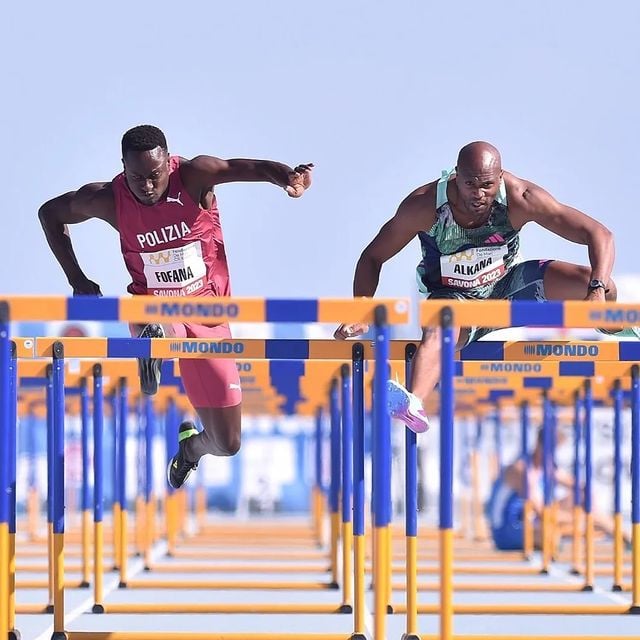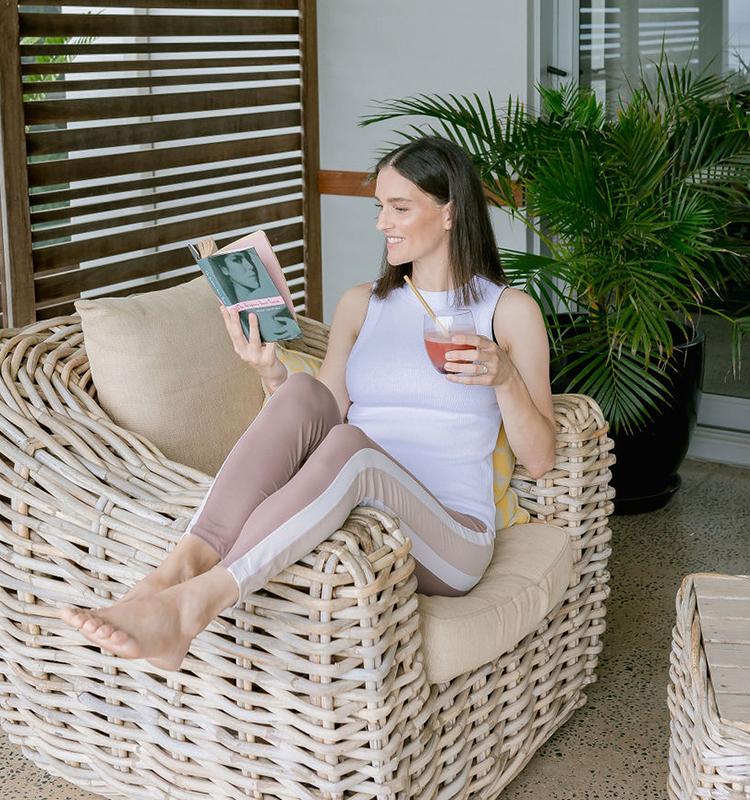What does it take to be at the top of your game as an athlete who’s qualified for the 2024 Paris Olympics?
Three remarkable South African athletes - Erin Gallagher, Antonio Alakana, and Gowan Jones—each excelling in their respective disciplines of swimming, athletics, and hockey, offer a sneak peek into their daily routines, training and nutrition strategies, and the critical role of supplements in their recovery and injury prevention routines.
From the pool to the track and the hockey field, these athletes embody dedication, resilience, and a pursuit of excellence (day in and day out) that epitomises the Olympic spirit.
The athletes

Sport: Swimming
Competing for: 10 years
Follow Erin on Instagram

Sport: Hurdler
Competing for: 10 years
Follow Antonio on Instagram

Sport: Field hockey
Competing for: 14 years
Follow Gowan on Instagram
We sat down with these talented individuals to find out which habits have helped them to become world-class athletes on their road to Paris.
What are some of the physical demands of your sport and what requires the most energy and endurance?
Erin
With swimming being a type of ‘resistance’ training, it increases the body’s demand on its energy systems. It’s so important to train the different aspects in the pool including strength, endurance, speed and cardiovascular fitness.
I train 8-9 times a week for 1.5-2 hours a session and in each session, I aim to reach those different energy systems which are quite demanding on the body. On top of that, swimming is a bilateral sport so it’s very important to have both sides of the body working in tandem.
I spend 2 gym sessions a week working on strength and I do rehabilitation exercises every day to strengthen the smaller muscles around my joints to help keep a balance and reduce any weaknesses.
At times, focusing on smaller, weaker muscles that demand intense concentration can be tiring.
Antonio
To do well in a particular sport, especially running, you need:
- Mental toughness
- Strength on the track and in the gym
- To push yourself every day to be better than you were yesterday
Gowan
Hockey is a physically demanding sport as the position I play, which is goalkeeper, requires me to be fast and agile all the time.
When we tour, our schedule is generally very busy with games often 24hrs of each other. The training that we do has to mimic the game as much as possible. So, most of our turf and gym sessions involve a lot of plyometric work.
Good to know: Plyometrics are explosive exercises that involve quick, powerful movements to enhance athletic performance and increase speed and strength. Examples of plyometric exercises include box jumps, depth jumps, and clap push-ups, which all focus on developing fast-twitch muscle fibres and improving overall power and agility.
How do you train for the demands of your sport? Do you use specialised routines?
Erin
To stay on top of the physical demands of swimming, I prioritise several key habits. I make sure to eat consistently throughout the day, sticking to regular mealtimes to keep my body fuelled and on track. Sleep is also a priority—I aim to go to bed around the same time every night to ensure I get close to 8 hours of rest for optimal recovery.
I incorporate stretching into my routine both at night before bed and during the day before training sessions. Additionally, I pay special attention to my immunity and gut health, which is where my supplementation regimen plays a big role in supporting my overall well-being.
Antonio
When it comes to running training, I've learned to listen to my body. If I feel any sort of niggle crop up, I'll try to get the first available appointment from a physio so that we can nip it in the bud as soon as possible and reduce the risk of injury.
Gowan
As hockey goalkeepers we have specific training sessions that we have to do. Mostly speed, agility and power work. The running work we do is short and fast work – which is where the benefit of plyometrics comes in.
How do you prioritise nutrition in your training routine and overall lifestyle?
Erin
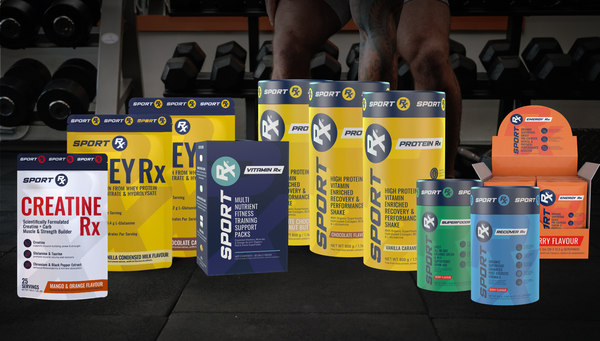
Nutrition is one of the most important aspects in my training routine. If my nutrition is off, I can feel it immediately and it affects how I perform in the pool. So, this is one of my top priorities in terms of recovering and staying healthy enough to continue training. I avoid certain foods if I know it’s going to be detrimental to my nutrition. I also make sure I eat a lot of the good stuff.
The key components of my diet are protein, vegetables, and carbohydrates, and at certain times in my training, I include healthy fats too. I eat three main meals a day which all consist of the above mentioned.
I also enjoy three 3 snacks throughout the day which consist of different types of protein and fruit. It’s sometimes difficult to fit in all the food I need to eat which is why I rely heavily on SPORT Rx and Natures Nutrition supplements because when I take them, I know that I’m getting everything and more that I need to meet my daily nutrition goals.
Antonio
Nutrition is a vital part of my training not only for the energy and focus it provides during training, but most importantly the recovery benefits you get after training from good quality food and supplementation.
I don't follow a specific diet, but I do generally watch what I eat and try to get protein in before and after training (to maintain muscle mass and speed up recovery).
Gowan
Good nutrition is a massive part of how I recover and allow myself to train at 100% every session. The SPORT Rx range has a product for every part of my performance and recovery. In fact, SPORT Rx’s RECOVER Rx has been my go-to when on tour in hot, humid environments.
Good to know:
RECOVER Rx is a scientifically formulated supplement designed to speed up post-exercise recovery and give your body what it needs to thrive. The potent formula features a rich blend of superfoods packed with essential macro- and micronutrients to optimise muscle and overall body recovery.
Key ingredients like branch chain amino acids (BCAAs), hydrolysed collagen, and
L-glutamine promote vital muscle tissue repair, while electrolytes help rehydrate muscles and replenish essential body stores. Organic superfoods provide crucial micronutrients for peak performance, and vitamin C supports immune function post-workout.
With RECOVER Rx, you can support your muscle recovery, protect your joints, and combat inflammation to ward off any potential injuries.
Do you use supplements into your daily routine?
Erin
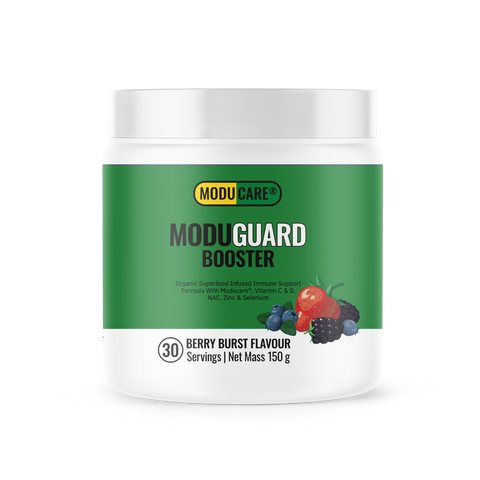
Absolutely! I couldn’t get through a day without my supplements. I have WHEY Rx twice a day for breakfast, and in my yoghurt as a late-night snack before bed. I also use CREATINE Rx everyday which is a huge booster in my recovery and hence why I use it daily.
I use Beauty Gen collagen products often to strengthen my bones, tendons and ligaments and I like to include a scoop of Natures Nutrition 50 Organic Superfoods into my yoghurt or smoothies for a nutrient boost. to support my nutrition and immune system further, I also include ModuGuard Booster in my smoothies as its packed with essential vitamins, minerals like zinc and Moducare ® to enhance my immune system’s response to infections and inflammation.
Antonio
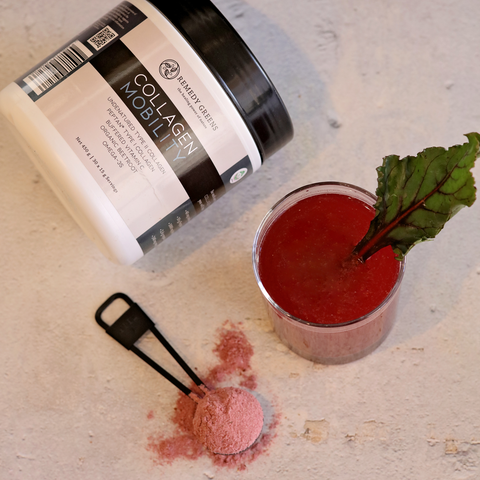
Having focus, energy and prioritising recovery are most important for me, so I do use supplements to give me the boost I need during training and competitions. Here’s an example of what I use and when:
- At breakfast: PROTEIN Rx + vitamins
- During training: ENERGY Rx before each session
- At lunch: I have a meal with WHEY Rx
- At dinner: I’ll have a meal with WHEY Rx and Remedy Greens Collagen Mobility.
Gowan
I definitely use supplements in my daily training. Some of my favourites are from the SPORT Rx range, including:
VITAMIN Rx – for strong immunity
RECOVER Rx - after training sessions and matches.
PROTEIN Rx - to retain muscle mass and speed up recovery
ENERGY Rx - only on game days to help with focus and stamina
Do you the supplements you take improve your performance?
Erin
I know for certain that I wouldn't be where I am today without them. For instance, there was a time when I ran out of my WHEY Rx for two weeks and decided to push through until the new month.
However, during that time, I noticed my body feeling weaker, my training times were off, and when I consulted with my dietitian, I discovered that I had lost 2 kilograms of muscle mass.
A week after I’d started taking WHEY Rx again, I’d gained that muscle back, lost fat and my times were back on track and even faster… and that’s the benefit of ONE product, so the fact that I am taking so many other products (mentioned above) that look after my health, immunity and well-being, I don’t doubt for a second that they contribute to my success.
Antonio
SPORT Rx takes care of my nutritional needs and helps me to fill in nutritional gaps so that I get in my essential vitamins and nutrients and feel my best most of the time.
Gowan
The supplements I take contribute greatly to the success of my training. From helping to fight off illness, prevent dehydration and aid in muscle recovery, they play a key role when we’re in busy phases of training.
At a training camp, for instance, we can do anywhere between 4-6 hours of training a day for 1-2 weeks at a time, which is very intense.
Have you experimented with different supplements? How did you determine which ones worked best for you?
Erin

Absolutely, I used to take PROTEIN Rx but then tried WHEY Rx and found that my body responded better to the latter. That’s not to say I don’t use the protein supplement - I just make sure that I always incorporate the whey into my daily routine because my body seems to prefer the isolated protein more.
I’ve experimented with quite a few collagen products in the Beauty Gen range, and I think all of them are really beneficial for your joints and bones, plus they’re super easy to use because they’re tasteless, so you can sneak them into anything—even your coffee!
Gowan
I have tried many supplements, for me it's the simplest of ones that work the best. No need to over complicate it. Use the basics and it will all work out.
How has your nutrition changed throughout your career to match your training and competition schedule?
Erin
A couple of years ago, I used to despise eating healthily – vegetables were few and far between and I’d take so many vitamins just to make up for what I wasn’t eating.
Using supplements has been super handy—they're convenient and I feel good about what I'm putting in my body.
Now I pay attention to what my body craves, especially when my training ramps up. I know I need to up my food and sleep game. Usually, it's a bit of both, and the immune-enhancers I use are a game-changer.
Gowan
I’ve adapted my routine over the years and tried to learn what my body needs and when it needs it. I don't generally change my nutrition plan so much.
What nutritional strategies do you focus on during competitions or before important races?
Erin

Before competitions, our bodies are vulnerable to illness due to tapering, which increases the need for rest and can lead to susceptibility to sickness. Personally, I prioritise clean, healthy foods and increase my intake of vitamins and superfoods to boost my immunity during these critical periods.
During competitions, it's tough to stick to my usual diet because I'm often overseas with different food options. Thankfully, the SPORT Rx and Natures Nutrition supplements keep me on track.
I lose muscle quickly during competitions, but WHEY Rx helps me to preserve as much as possible. Natures Nutrition also keeps me healthy in the intense physical and emotional atmosphere of competition, which really takes a toll on my body.
Gowan
During a camp or tournament, the most important thing for me is definitely nutrition after the games and training sessions.
I try and keep my diet simple with good sources of macronutrients including carbohydrates, protein and fats. Here’s an idea of my daily diet:
- Breakfast: Oats and PROTEIN Rx with vitamins
- Snack: Fruit and water
- Lunch: Some form of protein with carbohydrates and fats.
- Pre-training snack: Rice cakes and peanut butter
- Dinner: Plenty of vegetables, protein and carbohydrates with a nutritional shake.
As these athletes gear up for the 2024 Paris Olympics, their experiences highlight a clear reality: achieving success in sports requires more than just skill and effort. It also involves smart planning, including good nutrition and supplementation along with effective sleep, stress management and recovery – plus, a strong “can-do” mindset. Their paths offer important lessons on excelling in Olympic sports, but also motivating us to aim higher and pursue greatness in whatever we do.
Visit welliam.co.za for clean, performance-boosting supplements you can trust.
